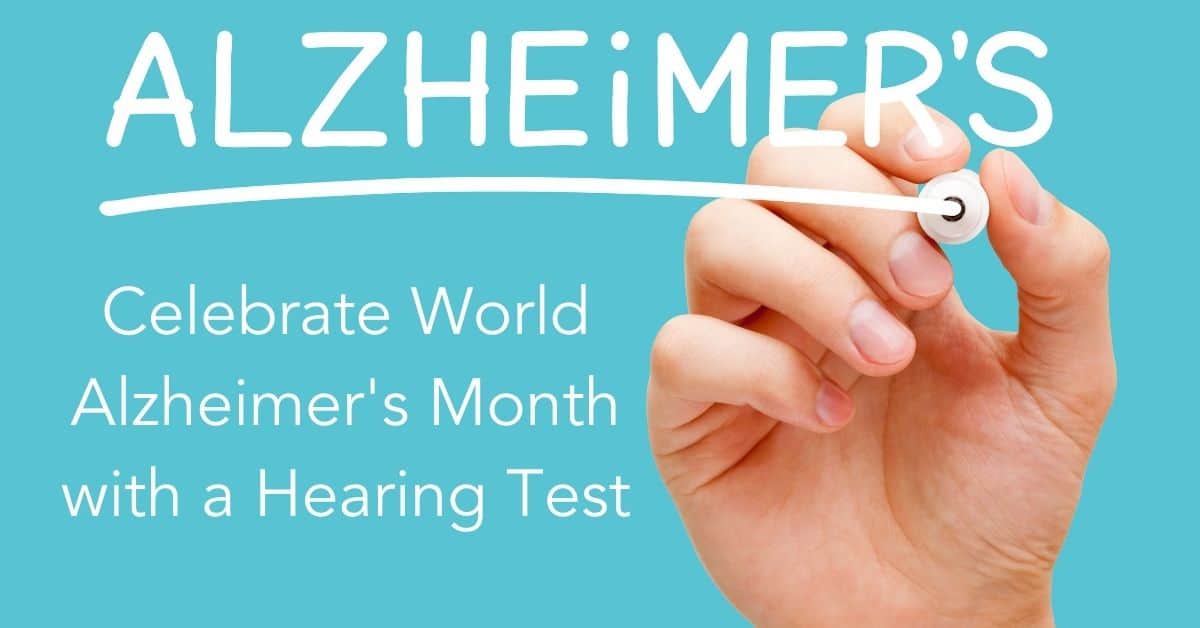- Up in Smoke: Exploring the Hidden Risks of Tobacco Use on Hearing Health - April 10, 2024
- Navigating Hearing Loss as a Millennial - March 13, 2024
- Understanding the Testing Process: What to Expect During a Hearing Evaluation - February 14, 2024
Did you know that September is World Alzheimer’s Month!? Alzheimer’s is a rapidly growing disease so this month is dedicated to raising awareness, destigmatizing dementia, and letting people know how they can take action. Alzheimer’s is a form of dementia which refers to a group of conditions that deteriorate cognitive functions like memory, decision making, learning, problem solving etc. There are several types of dementia including: Lewy Body, Parkinson’s, Huntington’s, vascular, and frontotemporal. Alzheimer’s disease is the most common and severe form of dementia, accounting for 60-80% of all cases.
Nearly 6 million people in the U.S. live with Alzheimer’s which is a progressive disease. It often starts with mild issues with memory and can gradually become a complete inability to function independently. Because there currently is no cure for Alzheimer’s, there is emphasis on ways to prevent or delay its progression. Extensive research has established that treating hearing loss can reduce the risk of cognitive decline. You can easily celebrate World Alzheimer’s Month by scheduling an appointment to have your hearing tested!
Understanding Hearing Loss
1 in 8 people have some degree of hearing loss which impacts over 40 million people in the U.S. alone. Hearing loss can be caused by a variety of factors including:
- Existing medical conditions: such as hypertension, diabetes, obesity, cardiovascular disease can contribute to hearing loss.
- Genetic history: family history of hearing loss can increase predisposition to impairment
- Exposure to loud noise: absorbing noise above 85 decibels is potentially harmful to hearing. We are exposed to increased levels of sound in various environments including concerts, job sites, sports games, headphones etc.
Hearing loss results in a reduced ability to hear and process sound which causes a range of symptoms that disrupt daily life including:
- A buzzing or ringing noise in one or both ears, known as tinnitus
- Increasing the volume on electronic devices (television, speaker, smartphone)
- Sounds are muffled and unclear
- Difficulty hearing especially in places with background noise
- Asking others to repeat what they’ve said, speak loudly and/or slowly
- Needing to move to a quieter area to have a conversation
- Reading mouths to identify words
These symptoms can be experienced mildly to profoundly, straining communication which has multifaceted effects on health and well-being. Untreated hearing loss can worsen impairment as well as accelerate the development of medical conditions like Alzheimer’s.
Link Between Alzheimer’s & Hearing Loss
Studies show that Alzheimer’s and hearing loss are correlated. In fact, research reveals that hearing loss contributes to cognitive decline. In a major study, published in 2019, researchers found that cognitive decline was:
- 30% higher for people with mild hearing loss
- 42% higher for people with moderate hearing loss
- 54% higher for people with severe hearing loss
These findings show that not only is there a link between these conditions but also that the more severe the hearing loss, the likelier cognitive decline is. Though this correlation continues to be investigated to figure out how, researchers have suggested a few theories including: brain atrophy and cognitive fatigue.
This link also highlights that treating hearing loss can decrease the risk of cognitive decline which is why assessing your hearing is critical!
Taking a Hearing Test
You may feel nervous about taking a hearing test but they are noninvasive and painless! You can expect a few things to happen:
- Health History Intake: similar to most medical appointments, your medical and health history will be collected. You can expect to provide information about any medical conditions, medications, genetic history, and symptoms.
- Hearing Test: conducted by a hearing healthcare specialist, you will be asked to wear headphones and enter a sound booth. The headphones will be connected to an audiometer which is an instrument that will play sounds at different frequencies. You will indicate what you can hear.
- Results: this information will be tracked on a chart which visually represents your hearing ability in both ears. This will also indicate any impairment and the degree.
Fortunately, there are useful ways to treat hearing loss that can drastically improve hearing health. A great way to celebrate World Alzheimer’s Month is by scheduling your appointment today!
![Audiology Consultants] of Panama City](https://audiology-consultants.com/wp-content/uploads/2018/04/Audiology-Consultants-of-Panama-City-1.png)

